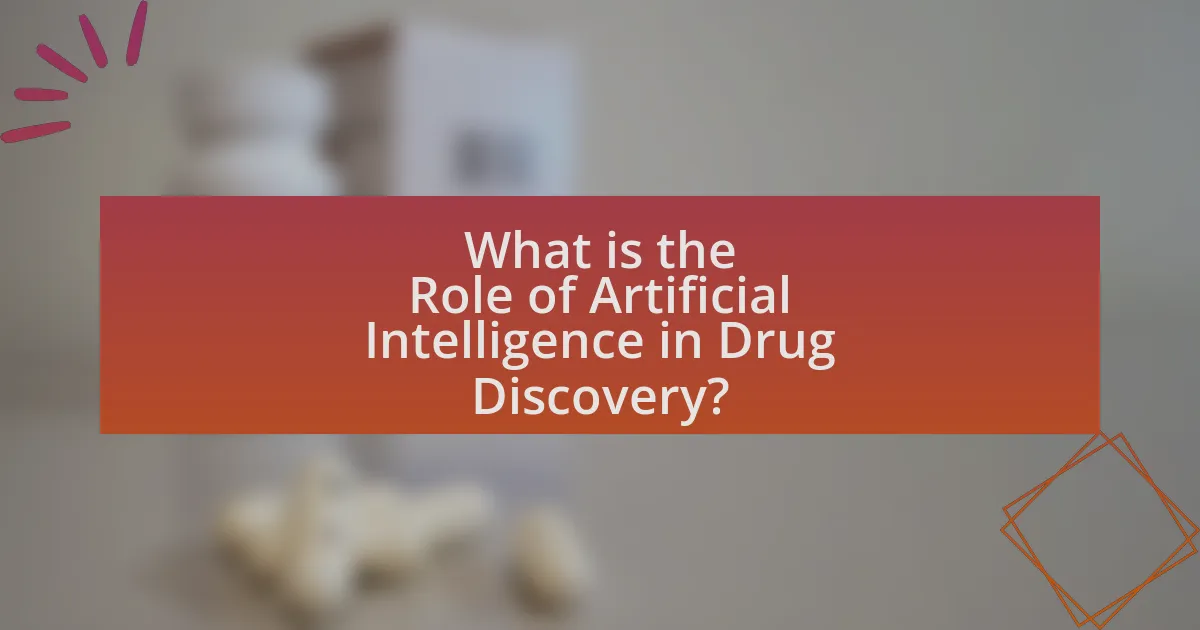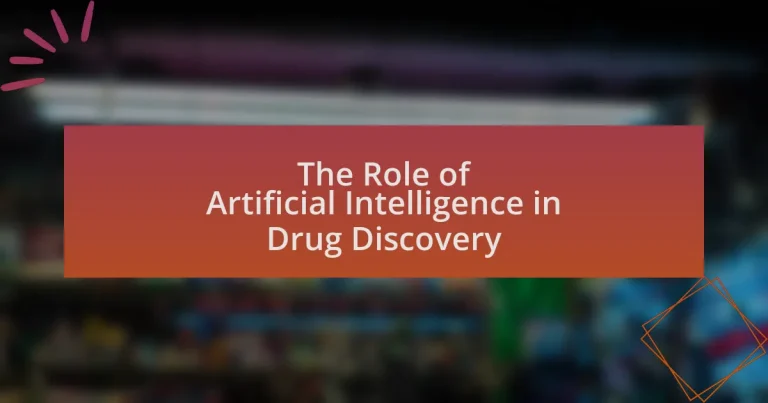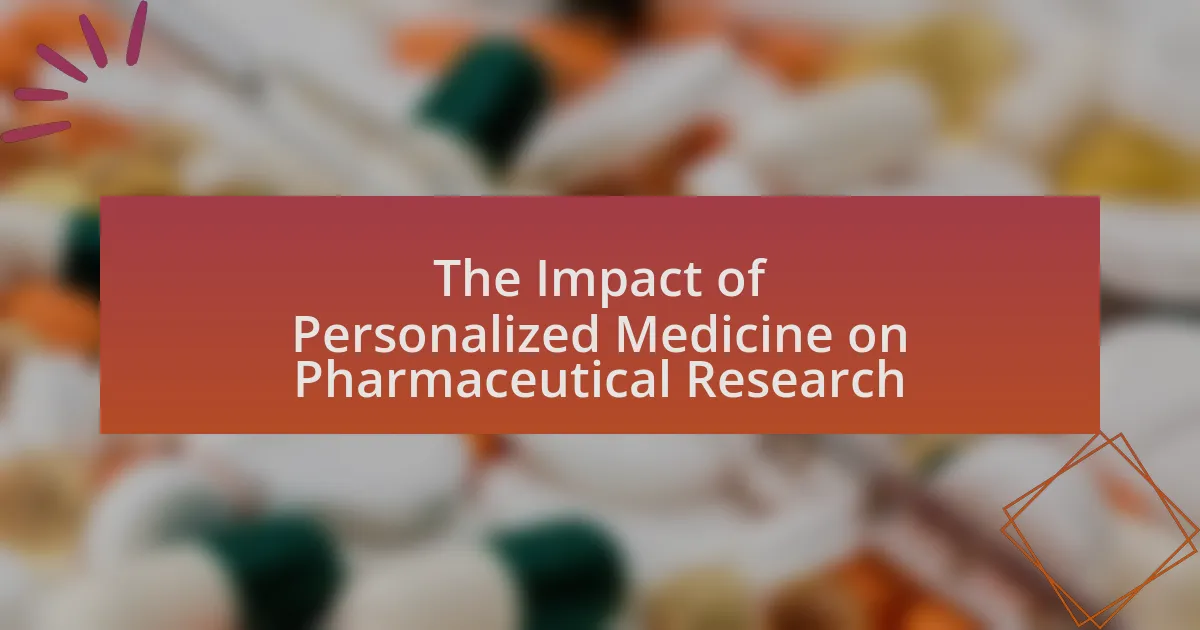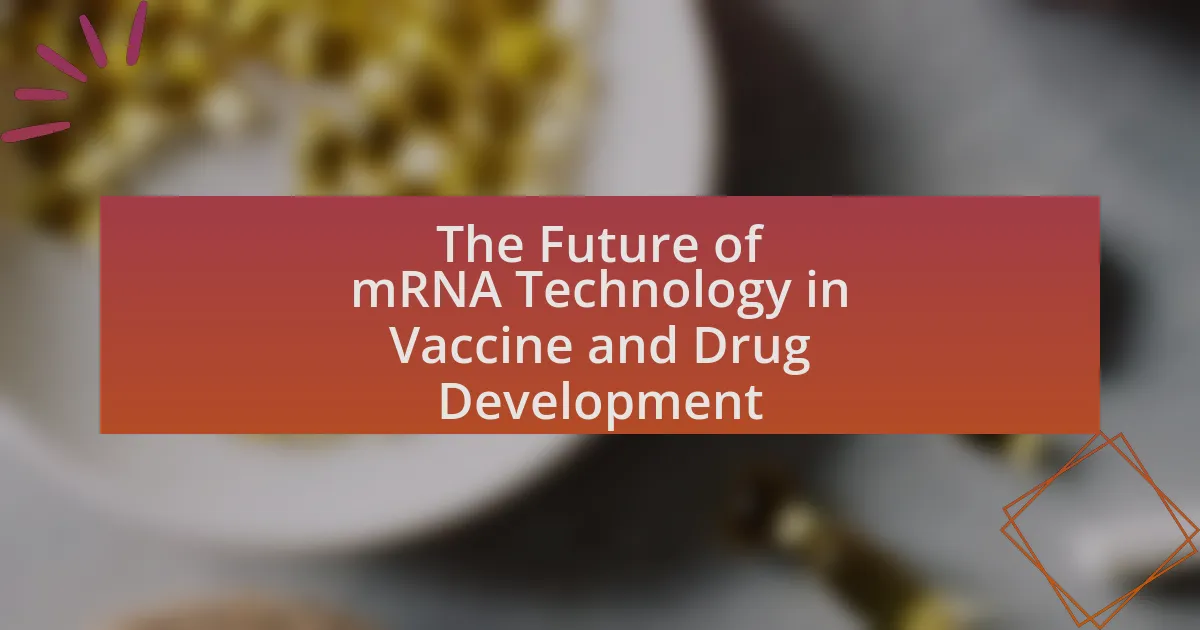Artificial Intelligence (AI) is revolutionizing the drug discovery process by improving efficiency and accuracy in identifying potential drug candidates and optimizing their development. The article explores how AI algorithms analyze extensive datasets, predict molecular interactions, and streamline various stages of drug discovery, including target identification and clinical trial design. It highlights the significant impact of machine learning and deep learning technologies, while also addressing challenges such as data quality and interpretability. Furthermore, the article discusses the ethical considerations and future trends of AI in personalized medicine and therapy development, emphasizing best practices for successful implementation in the pharmaceutical industry.
What is the Role of Artificial Intelligence in Drug Discovery?

Artificial Intelligence plays a crucial role in drug discovery by enhancing the efficiency and accuracy of the drug development process. AI algorithms analyze vast datasets to identify potential drug candidates, predict their interactions, and optimize chemical structures. For instance, a study published in Nature Reviews Drug Discovery highlights that AI can reduce the time required for drug discovery by up to 50% and significantly lower costs, with companies like Atomwise using deep learning to predict molecular interactions effectively. This integration of AI not only accelerates the identification of viable compounds but also improves the likelihood of clinical success, demonstrating its transformative impact on the pharmaceutical industry.
How does Artificial Intelligence contribute to the drug discovery process?
Artificial Intelligence significantly enhances the drug discovery process by streamlining data analysis, predicting molecular behavior, and optimizing clinical trials. AI algorithms can analyze vast datasets, including genomic, proteomic, and chemical information, to identify potential drug candidates more efficiently than traditional methods. For instance, a study published in Nature Biotechnology demonstrated that AI models could predict the success of drug candidates with up to 90% accuracy, significantly reducing the time and cost associated with drug development. Additionally, AI facilitates the design of novel compounds by simulating interactions at the molecular level, which accelerates the identification of effective therapies.
What are the key stages of drug discovery where AI is applied?
AI is applied in several key stages of drug discovery, including target identification, lead discovery, preclinical testing, and clinical trial design. In target identification, AI algorithms analyze biological data to identify potential drug targets, significantly speeding up the process. During lead discovery, AI models predict the interaction between compounds and targets, optimizing the selection of promising candidates. In preclinical testing, AI helps in analyzing data from experiments to assess the efficacy and safety of drug candidates. Finally, in clinical trial design, AI assists in patient stratification and optimizing trial protocols, enhancing the likelihood of successful outcomes. These applications demonstrate AI’s ability to streamline and enhance the drug discovery process, leading to more efficient development of new therapeutics.
How does AI improve the efficiency of these stages?
AI improves the efficiency of drug discovery stages by accelerating data analysis and enhancing predictive modeling. For instance, AI algorithms can process vast datasets from biological and chemical research much faster than traditional methods, identifying potential drug candidates with greater accuracy. A study published in Nature Reviews Drug Discovery highlights that AI can reduce the time required for lead identification by up to 50%, significantly shortening the overall drug development timeline. Additionally, machine learning models can predict the success rates of drug compounds, allowing researchers to focus resources on the most promising candidates, thereby optimizing the entire drug discovery process.
What are the main types of Artificial Intelligence used in drug discovery?
The main types of Artificial Intelligence used in drug discovery are machine learning, deep learning, natural language processing, and reinforcement learning. Machine learning algorithms analyze large datasets to identify patterns and predict drug interactions, while deep learning models, particularly neural networks, excel in processing complex biological data. Natural language processing aids in extracting relevant information from scientific literature and databases, facilitating knowledge discovery. Reinforcement learning optimizes drug design by simulating various scenarios and learning from outcomes. These AI types enhance efficiency and accuracy in the drug discovery process, leading to faster development of new therapeutics.
What is machine learning and how is it utilized in drug discovery?
Machine learning is a subset of artificial intelligence that enables systems to learn from data and improve their performance over time without being explicitly programmed. In drug discovery, machine learning is utilized to analyze vast datasets, identify potential drug candidates, predict their interactions with biological targets, and optimize chemical structures for efficacy and safety. For instance, a study published in Nature Reviews Drug Discovery highlights that machine learning algorithms can predict the success of drug candidates in clinical trials with up to 90% accuracy, significantly accelerating the drug development process and reducing costs.
How does deep learning differ from traditional machine learning in this context?
Deep learning differs from traditional machine learning in drug discovery by utilizing neural networks with multiple layers to automatically extract features from complex data, whereas traditional machine learning relies on manual feature extraction and simpler algorithms. In the context of drug discovery, deep learning can analyze vast datasets, such as genomic and chemical information, to identify patterns and predict molecular interactions more effectively than traditional methods, which often struggle with high-dimensional data. For instance, a study published in Nature Biotechnology demonstrated that deep learning models significantly outperformed traditional machine learning approaches in predicting drug-target interactions, highlighting the superior capability of deep learning in handling complex biological data.
What challenges does Artificial Intelligence face in drug discovery?
Artificial Intelligence faces several challenges in drug discovery, including data quality, interpretability, and integration with existing workflows. Data quality is critical, as AI models require large, high-quality datasets to make accurate predictions; however, many datasets are incomplete or biased, which can lead to unreliable results. Interpretability is another significant challenge, as many AI algorithms, particularly deep learning models, operate as “black boxes,” making it difficult for researchers to understand how decisions are made. Additionally, integrating AI tools into existing drug discovery workflows poses logistical and technical hurdles, as researchers must adapt to new technologies while ensuring compliance with regulatory standards. These challenges hinder the full potential of AI in accelerating drug discovery processes.
What are the limitations of current AI technologies in this field?
Current AI technologies in drug discovery face several limitations, including data quality issues, interpretability challenges, and integration difficulties. Data quality is often compromised due to incomplete, biased, or noisy datasets, which can lead to inaccurate predictions and hinder the drug development process. Interpretability challenges arise because many AI models, particularly deep learning algorithms, function as “black boxes,” making it difficult for researchers to understand how decisions are made. Additionally, integrating AI systems with existing workflows and regulatory frameworks poses significant obstacles, as these technologies must align with established practices in pharmaceutical research and development. These limitations collectively impede the full potential of AI in enhancing drug discovery efficiency and effectiveness.
How can data quality impact the effectiveness of AI in drug discovery?
Data quality significantly impacts the effectiveness of AI in drug discovery by determining the accuracy and reliability of the insights generated. High-quality data enables AI algorithms to identify patterns, predict outcomes, and optimize drug candidates more effectively, leading to faster and more successful drug development processes. Conversely, poor data quality can result in misleading conclusions, increased costs, and failed trials, as evidenced by a study published in the journal “Nature Biotechnology,” which found that data inconsistencies can lead to a 30% increase in the time required for drug development. Thus, ensuring robust data quality is essential for maximizing the potential of AI in this field.
How is Artificial Intelligence transforming the pharmaceutical industry?
Artificial Intelligence is transforming the pharmaceutical industry by significantly accelerating drug discovery processes and enhancing the precision of drug development. AI algorithms analyze vast datasets, including genomic information and clinical trial results, to identify potential drug candidates more efficiently than traditional methods. For instance, a study published in Nature Biotechnology demonstrated that AI could reduce the time required for drug discovery from years to just months, showcasing its ability to predict molecular interactions and optimize lead compounds effectively. This transformation not only streamlines research but also reduces costs, making it a pivotal force in modern pharmaceutical innovation.
What are the ethical considerations surrounding AI in drug discovery?
The ethical considerations surrounding AI in drug discovery include issues of data privacy, algorithmic bias, and accountability. Data privacy is critical as AI systems often require access to sensitive patient information, raising concerns about consent and data security. Algorithmic bias can lead to unequal treatment outcomes if the training data does not represent diverse populations, potentially exacerbating health disparities. Accountability is essential, as it must be clear who is responsible for decisions made by AI systems, particularly in cases of adverse drug reactions or failures in clinical trials. These considerations are supported by research indicating that ethical frameworks are necessary to guide the development and deployment of AI technologies in healthcare, ensuring they align with societal values and public trust.
What are the future trends of Artificial Intelligence in drug discovery?
Future trends of Artificial Intelligence in drug discovery include enhanced predictive modeling, integration of multi-omics data, and increased automation in laboratory processes. Enhanced predictive modeling utilizes machine learning algorithms to identify potential drug candidates more efficiently, significantly reducing the time and cost associated with traditional methods. The integration of multi-omics data, which combines genomics, proteomics, and metabolomics, allows for a more comprehensive understanding of disease mechanisms, leading to more targeted therapies. Increased automation in laboratory processes streamlines workflows, enabling faster experimentation and data collection. These trends are supported by advancements in computational power and the growing availability of large datasets, which facilitate more sophisticated AI applications in the pharmaceutical industry.
How might AI change the landscape of personalized medicine?
AI will significantly transform personalized medicine by enabling more accurate patient stratification and tailored treatment plans. Through advanced data analytics and machine learning algorithms, AI can analyze vast amounts of genetic, clinical, and lifestyle data to identify specific patient subgroups that may respond better to particular therapies. For instance, a study published in Nature Biotechnology demonstrated that AI models could predict patient responses to cancer treatments with up to 90% accuracy by integrating genomic data and clinical histories. This capability allows healthcare providers to move away from a one-size-fits-all approach, leading to improved treatment efficacy and reduced adverse effects.
What role will AI play in accelerating the development of new therapies?
AI will significantly accelerate the development of new therapies by enhancing drug discovery processes through advanced data analysis and predictive modeling. By utilizing machine learning algorithms, AI can analyze vast datasets to identify potential drug candidates more quickly than traditional methods. For instance, a study published in Nature Biotechnology demonstrated that AI models could predict the success of drug candidates with up to 90% accuracy, thereby reducing the time and cost associated with clinical trials. This capability allows researchers to focus on the most promising therapies, ultimately speeding up the time it takes to bring new treatments to market.
What best practices should be followed when implementing AI in drug discovery?
Best practices for implementing AI in drug discovery include ensuring high-quality data, fostering interdisciplinary collaboration, and maintaining regulatory compliance. High-quality data is crucial as AI models rely on accurate and comprehensive datasets to make reliable predictions; studies show that data quality directly impacts the performance of machine learning algorithms. Interdisciplinary collaboration among biologists, chemists, and data scientists enhances the understanding of complex biological systems and improves model development. Additionally, adhering to regulatory guidelines ensures that AI applications meet safety and efficacy standards, which is essential for successful drug approval processes.





